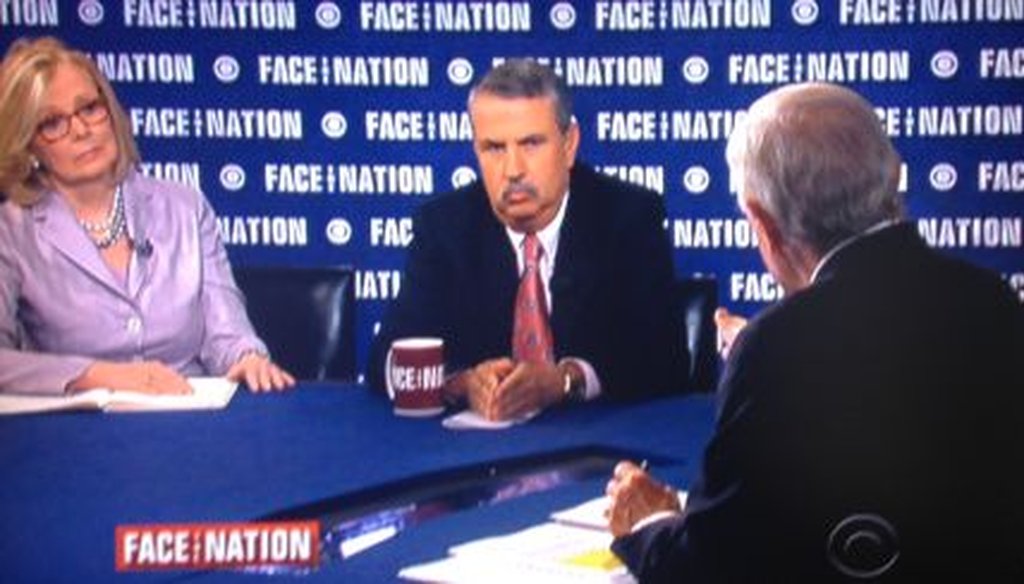Stand up for the facts!
Our only agenda is to publish the truth so you can be an informed participant in democracy.
We need your help.
I would like to contribute

Peggy Noonan and Thomas Friedman discuss the Bowe Bergdahl prisoner swap on CBS' "Face the Nation."
As Sgt. Bowe Bergdahl recuperates at a military hospital in Germany and the five Taliban soldiers swapped for him enjoy their first days of freedom in Qatar, pundits and politicians on Sunday continued to debate whether the prisoner exchange was wise.
Critics of the prisoner swap were careful not to criticize President Barack Obama’s decision to try and rescue Bergdahl, despite Bergdahl’s decision to allegedly walk off a U.S. military base. Rather, they centered in on the terms of the deal, in which the United States traded five Taliban detainees, some of whom are considered high risk.
"I believe there are other prisoners, some of whom we have already released, that we could have released in exchange," Sen. John McCain, R-Ariz., said on CNN’s State of the Union. "These five are the top five picked by the Taliban. Not by us, but by the Taliban."
On Fox News Sunday, conservative journalist Stephen Hayes tried to offer additional perspective.
"The administration went to court to keep one of these five in jail at Guantanamo just three years ago because he was such a huge risk, such a risk to U.S. national security," Hayes, who writes for the Weekly Standard, said. "And now they're letting him walk."
Sign up for PolitiFact texts
We focused on Hayes’ claim that administration "went to court to keep one of these five in jail at Guantanamo just three years ago because he was such a huge risk." That rates Half True.
Hayes is correct that the Obama administration fought in court to keep one of the now-free prisoners, Mullah Khairullah Khairkhwa, at a Guantanamo Bay, Cuba, detention facility. But it wasn’t explicitly because "he was such a huge risk."
Khairkhwa, captured in 2002, was appealing for his release, saying he was being held illegally. In 2008, the U.S. Supreme Court ruled that Guantanamo Bay detainees had the right to challenge the legality of their confinement.
At question in the case wasn’t whether the Obama administration considered Khairkhwa a risk. They didn’t have to prove that, as the court made that clear in its ruling. "The government's authority to detain an enemy combatant is not dependent on whether an individual would pose a threat to the United States or its allies if released," the court wrote.
Rather, the Obama administration simply had to prove that, under the Authorization for Use of Military Force granted by Congress, Khairkhwa was a member of the Taliban or al-Qaida or associated forces at the time of his capture.
The United States had ample evidence to make their case. Kharikhwa was part of the Taliban’s highest governing body and was a known associate of Osama bin Laden.
Another claim we heard about the Bergdahl case didn’t come on Sunday, but we thought it was worth checking.
It came from an unlikely defender of Obama, conservative pundit Charles Krauthammer.
Krauthammer has come out supporting the prisoner swap, describing it as unattractive part of doing business.
"We have long engaged -- and all other countries in the West have long engaged -- in hostage swaps where the West always comes out on the short end," Krauthammer told Fox News host Bret Baier last week. "And the reason is that we put a value on an individual human life the way that the barbarians at the other end of the table don't."
To demonstrate that other western countries have been on the short end of such swaps, Krauthammer cited an Israeli hostage exchange from 2011.
"The best example is the Israelis, who gave up 1,000 terrorists in return for one sergeant," Krauthammer said.
Krauthammer’s claim rates True.
In 2006, the Islamic terrorist organization Hamas captured Israeli Sgt. Gilad Shalit after tunneling into Israel and attacking an army outpost.
Israel’s first attempt to free Shalit, by launching a military invasion into Hamas-controlled Gaza, failed.
Shalit was held captive for five years. During that time, many Israelis pleaded with their government to strike a deal for Shalit’s return. Israel had already failed to secure the freedom of Air Force Navigator Ron Arad, who had crashed his warplane in Lebanon 25 years before his death in 2008 while in the control of Shiite captors. Many Israelis worried that Shalit’s capture would end the same way.
But it didn’t.
Shalit returned home on Oct. 18, 2011, following Israel’s freeing of 1,027 Palestinian prisoners.
It's not clear that all 1,027 were "terrorists," but some were indeed terrorists serving several life sentences for killing Israeli citizens. (In addition, the definition of "terrorist" varies quite a lotdepending on who is using the term.)
Not all the talk was about Bergdahl, however. ABC’s This Week had a discussion about raising the minimum wage featuring The Nation’s Katrina vanden Heuvel and the Wall Street Journal’s Paul Gigot.
Vanden Heuvel argued that raising the minimum wage affects more than just young workers, claiming that, "Only one out of 10 minimum wage workers today are teen age or a young person."
That rates False.
The notion that most minimum wage earners are young workers starting out their professional careers or teenagers working over the summer or to pay for college is not always cut and dried. A February Congressional Budget Office report says that "of the 5.5 million workers who earned within 25 cents of the minimum wage in 2013, three-quarters were at least 20 years old and two-fifths worked full time."
But vanden Heuvel messed up her talking point. According to the Bureau of Labor Statistics, workers who are 16 to 24 years old comprise 50 percent of workers who earn at or below the federal minimum wage of $7.25 an hour.
Vanden Heuvel was attempting to reference a study prepared by the liberal Economic Policy Institute, which supports raising the minimum wage.
Among the people who EPI believes would get a raise -- which includes people making up to $11.10 an hour, only 12.5 percent are less than 20 years old.
Steve Contorno, Shannon Beckham and Katie Sanders contributed to this report. Aaron Sharockman is the editor of PunditFact.com.
Our Sources
See individual fact-checks.




































